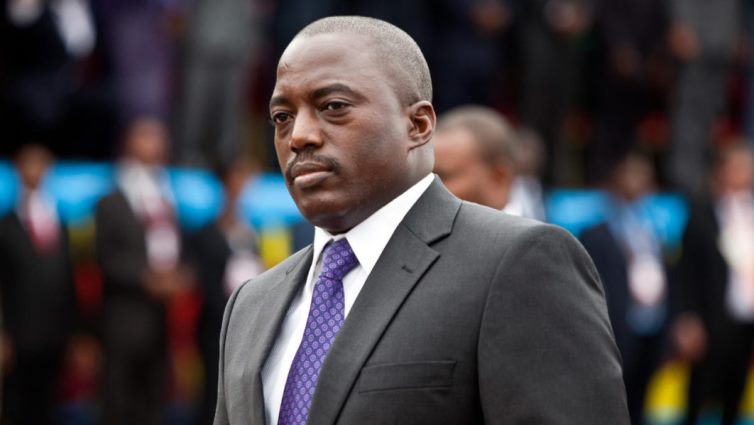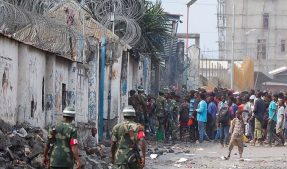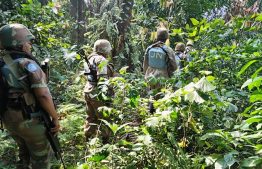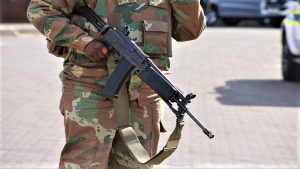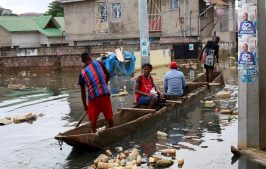Long ahead of the Democratic Republic of Congo’s presidential poll on 23 December 2018, the conditions appear already stacked against the opposition candidates, in favour of the handpicked candidate of outgoing country President Joseph Kabila.
The registration date for presidential candidates was set for 8 August 2018. DRC President Joseph Kabila on 8 August 2018 announced his handpicked successor, Emmanuel Ramazani Shadary, the former interior minister, as his preferred presidential candidate in the upcoming poll, the country’s most contested.
Shadary is the permanent secretary of the People’s Party for Reconstruction and Democracy (PPRD), the ruling part of Kabila. Opposition parties in the DRC risk splitting the vote, and so handing power back to Shadary, unless they join forces around one candidate.
Three prominent opposition leaders, Moise Katumbi, the former governor of Katanga province, Jean-Pierre Bemba the former DRC vice-president and Felix Tshisekedi, the leader of the Union for Democracy and Social Progress, all have ambitions to challenge Shadary, Kabila’s proxy for the presidency.
The DRC election, like typical African elections, is a winner takes all one. Whoever wins the upcoming elections will control every aspect of the state. Losers are likely to be excluded from all spheres of government. This phenomenon makes elections across Africa deadly affairs.
Kabila has been at the helm of the country since 2001, when he took over from his father Laurent Kabila, who was assassinated by his bodyguard.
Kabila was supposed to stand down in 2016 already following his second elected term. The country’s constitution puts a two-term limit on leaders. He has tried to stay on for a third term, but mass protests, especially by youth, civil society formations and opposition parties have blocked such attempts.
Having faced fierce opposition, he has opted to seek a pliant successor, Emmanuel Ramazani Shadary, who would presumably protect his political and business interests beyond his own presidency.
On 31 December 2016, Kabila signed an agreement, called the Saint Sylvester agreement, with opposition parties, civil society and international organisations which stipulate that government will improve the conditions for free and fair elections, allowing opposition leaders and parties to campaign freely, compiling a credible voters roll, and for civil society organisations, human rights activists and the media to operate with freedom.
However, Kabila has not implemented key elements of the agreement. He proscribed the activities of key opposition parties and leaders, civil society organisations and activities and the media. Some key opposition party leaders and civil society activists were forced into exile because of harassment.
Civil society organisations, especially those linked to the Catholic Church, have played an instrumental role in providing public services, keeping the peace and defending democratic rights in the face of a failed state and an oppressive governing regime.
Youth activists have used social media to organise protests against the regime, pass on information about rights abuses and conflicts to each other and the outside world. The independent media have played a key role in espousing rights abuses.
Kabila has made it difficult for serious opponents to challenge him or his handpicked successor in the upcoming elections. Kabila repeatedly blocked the return from exile of opposition leader Moise Katumbi, to contest the elections. Katumbi was the former governor of the Katanga province, and had been charged by Kabila for undermining state security.
A week before the deadline for candidates to register their presidential bids, Katumbi was refused entry from Zambia, in a clear bid to prevent him registering his candidacy. Katumbi has been in self-imposed exile in Belgium since 2016, following persistent harassment by the Kabila government.
Former DRC vice-president Jean-Pierre Bemba returned on time to lodge his candidacy after being acquitted of war crimes by the International Criminal Court (ICC) in The Hague in June 2018.
Zeid Ra’ad Al Hussein, the UN’s High Commissioner for Human Rights has already warned that “violations of human rights” ahead of the elections, is already casting “serious doubts about the credibility” of the coming elections.
Kabila has rejected offers of logistical support from the UN. He has claimed defending the DRC’s “sovereignty” and foreign meddling, in his rebuffs of outside help to organise the election.
A poorly executed election would favour the Kabila candidate. The collapse of the central state has caused armed groups to run parts of the country as their fiefdom, has unleashed health pandemics, such as Ebola outbreaks and has caused forced migration of displaced Congolese to neighbouring countries. In late July 2018, the DRC government announced a new outbreak of the deadly Ebola virus. A previous conflagration, the ninth, of the disease killed 33 people.
Transparency International ranked the DRC 156 out of 175 in its 2017 Corruption Perceptions Index. In June this year, Emmanuel Luzolo Bambi, an advisor to Kabila said that the DRC loses US$15bn on corruption and mismanagement every year, which is three times the country’s annual budget. The DRC’s annual budget is around US$5bn.
Rape of women is routinely used as a weapon by warring factions in the country. In 2010, Margot Wallstrom, the UN Secretary General’s Special Representative on Sexual Violence in Conflict, told the UN Security Council that the DRC is the “rape capital of the world”.
The DRC has large deposits of cobalt, copper, gold, uranium and coltan, a component of laptop computers and mobile phones. A high-level UN Security Council panel of experts reported in 2001 that Burundi, Rwanda and Uganda were making lucrative profits out of the war in the DRC. The UN report also listed foreign companies for looting the DRC.
The UN panel, called the Panel of Experts on the Illegal Exploitation of Natural Resources and other Forms of Wealth of the DRC, accused the three countries of mass looting and of securing the appointments of DRC provincial governors who help facilitate the looting.
Uganda since 1996 became a significant diamond exporter, although the country has no known gold deposits – with gold being siphoned out of the DRC. Similarly, Rwanda increased its gold exports almost 20 times since 1995, with gold coming again from the DRC.
The UN then warned unless action is taken against neighbouring countries and foreign companies that use the cover of the war in the DRC to loot the country, it is unlikely that the violence in the DRC would stop.
A crisis in the DRC will destabilise most of central and southern Africa, with a rise in forced migrations to neighbouring countries, including South Africa, and to Europe. Many neighbouring African countries are not interested to intervene, because the DRC conflict benefits them, as minerals mined in the DRC are siphoned off to neighbours, who earn income from such illicit flows.
Regional African institutions, such as the African Union and the Southern African Development Community have largely been paralysed. Most dominant leaders of the AU and SADC also secured power undemocratically, stay on longer than their official presidential terms allows them and routinely repress opposition groups, so they are unenthusiastic about condemning Kabila, for fear of facing the same scrutiny themselves.
The AU and SADC must act against Rwanda, Uganda and Burundi for helping fuelling the DRC conflict. Western governments in turn must act against their companies complicit in looting the DRC.
Finally, for the stability of the DRC, whoever wins the election must include the losers in a government of national unity or risk the country spiralling into civil war, more health epidemic outbreaks and further economic decline. South Africa, the AU and SADC must insist that the winner in the DRC establish a government of national unity which involves the losers.
William Gumede is Executive Chairperson of Democracy Works Foundation and author of South Africa in BRICS (Tafelberg).


